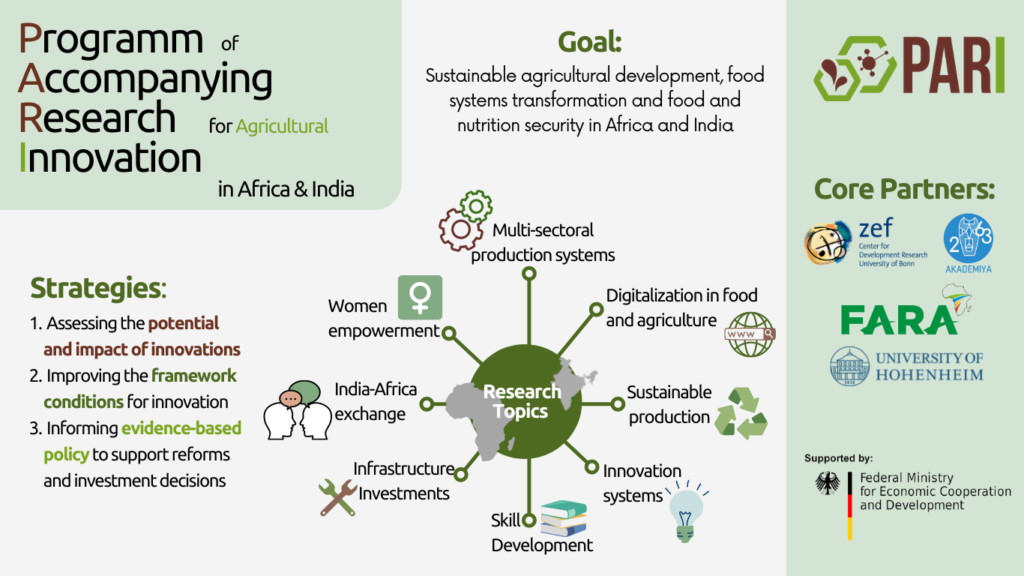About us PARI
The Program of Accompanying Research for Agricultural Innovation (PARI) brings together partners from Africa, India and Germany to conduct research on sustainable agricultural development, food systems transformation, and food and nutrition security in Africa and India. The program is supported by the German Federal Ministry for Economic Cooperation and Development (BMZ).
Innovations as key for food security and agricultural growth
Globally, more than 800 million people, or one in nine, are suffering from hunger. Two billion people worldwide are chronically malnourished. Ending hunger and malnutrition will require a holistic approach, starting from sustainable and climate-smart production to encompass all dimensions of the food system, including processing, distribution, marketing, consumption and disposal of food products originating from crops, livestock, forests and fisheries, and relates to health. Addressing the climate crisis is a major cross cutting theme, as is PARI’s focus on women and youth.
To build sustainable and resilient food systems, Africa is increasingly emphasizing the role of innovation. The Science, Technology and Innovation Strategy for Africa 2024 takes into consideration the social, economic, and technological progress Africa has made over the last decade. Innovation for sustainable and high agricultural growth forms an important part of this ambition. The German Government has acknowledged this innovation potential and supports the improvement of food and nutrition security and sustainable agricultural value chains through Green Innovation Centers (GICs) in Africa and India implemented by the GIZ.
PARI Objectives
PARI brings together partners from Africa, India and Germany to conduct research on sustainable agricultural development, food systems transformation, and food and nutrition security in Africa and India. To this end, PARI pursues the following strategies:
- Analysis of the potential and impact of innovations (which innovations to invest in, where and for whom – considering women, youth, small-scale producers),
- Identification and assessment of supportive measures to strengthen framework- and policy conditions for the generation and dissemination of promising innovations in food systems and rural areas, and
- Engaging food, nutrition, agriculture and rural areas’ science partners and policy makers to inform reforms and investment decisions that can improve job creation and food and nutrition security.
Priority themes and topics of PARI
The core topics and thematic research priorities of the PARI have been identified in accordance with the African Union’s CAADP (Africa’s policy framework for agricultural transformation, wealth creation, food security & nutrition, economic growth & prosperity for all) as part of the New Partnership for Africa’s Development (NEPAD), and PARI relates to the UN Food Systems Summit action agendas of 2021.
Drawing on these priorities as well as research findings by the PARI partners to date, research is structured in four themes:
Theme 1: Scaling innovations to promote multi-sectoral and sustainable approaches for small-scale producers
- Multi-sectoral approaches in small-scale production systems, incl. animal husbandry and aquaculture
- Promotion of sustainable, climate-smart production methods
- Targeted measures that specifically support and empower women
- Evaluation of experiences with the widespread dissemination of relevant technological and institutional innovations – Africa and India
Theme 2: Investment in infrastructure and skills as framework conditions for rural development and urban linkages
- Complementary investments in hard and soft infrastructure
- Innovative approaches to skill development for small-scale producers
Theme 3: Supporting sustainable and fair food systems through digital opportunities
Theme 4: Structural transformation of national agricultural innovation and research systems
Funding
The PARI is funded by the German Federal Ministry for Economic Cooperation and Development.

